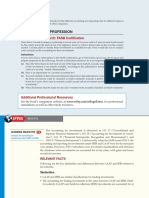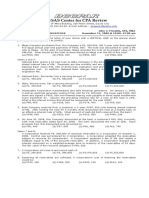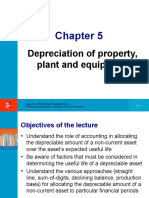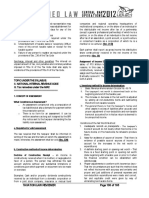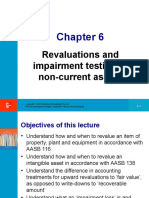0 ratings0% found this document useful (0 votes)
54 viewsGeneral Principles
General Principles
Uploaded by
Jericho Pedragosajhhjhjhj
Copyright:
© All Rights Reserved
Available Formats
Download as PDF or read online from Scribd
General Principles
General Principles
Uploaded by
Jericho Pedragosa0 ratings0% found this document useful (0 votes)
54 views14 pagesjhhjhjhj
Copyright
© © All Rights Reserved
Available Formats
PDF or read online from Scribd
Share this document
Did you find this document useful?
Is this content inappropriate?
jhhjhjhj
Copyright:
© All Rights Reserved
Available Formats
Download as PDF or read online from Scribd
Download as pdf
0 ratings0% found this document useful (0 votes)
54 views14 pagesGeneral Principles
General Principles
Uploaded by
Jericho Pedragosajhhjhjhj
Copyright:
© All Rights Reserved
Available Formats
Download as PDF or read online from Scribd
Download as pdf
You are on page 1of 14
2010 — 2015
TAXATION BAR EXAM QUESTIONS
ON
GENERAL PRINCIPLES OF TAXATION
Congress passed a sin tax law that increased the tax rates on cigarettes by 1,000%. The law was
thought to be sufficient to drive many cigarette companies out of business, and was questioned in
court by a cigarette company that would go out of business because it would not be able to pay the
Increased tax.
The cigarette company is (1%)(2013 Bar Question)
(A) wrong because taxes are the lifeblood of the government
(B) wrong because the law recognizes that the power to tax is the power to destroy
(©) correct because no government can deprive a person of his livelihood
(D) correct because Congress, in this case, exceeded its power to tax
SUGGESTED ANSWER:
(B) wrong because the law recognizes that the power to tax is the power to destroy
In McCulloch v. MarylandChief Justice Marshell declared that the power to tax involves the power to
destroy. This maxim only means that the power to tax includes the power to regulate even to the extent
of prohibition or destruction of businesses. The reason is that the legislature has the inherent power to
determine who to tax, what to tax and how much tax is to be imposed. Pursuant to the regulatory
purpose of taxation, the legislature may impose tax in order to discourage or probibit things or
enterprises inimical to the public welfare.”
In the given problem, the legislature’s imposition of prohibitive sin tax on cigarettes is congruent with
its purpose of discouraging the public form smoking cigarettes which are hazardous to health.
XYZ Corporation manufactures glass panels and is almost at the point of insolvency. It has no
more cash and all it has are unsold glass panels. It received an assessment from the BIR for
deficiency income taxes. It wants to pay but due to lack of cash, it seeks permission to pay in kind
with glass panels.
Should the BIR grant the requested permission? (1%)(2013 Bar Question)
(A) It should grant permission to make payment convenient to taxpayers.
) It should not grant permission because a tax is generally a pecuniary burden.
(C) It should grant permission; otherwise, XYZ Corporation would not be able to pay
(D) It should not grant permission because the government does not have the storage facilities for
glass panels
SUGGESTED ANSWER:
(B) It should not grant permission because a tax is generally a pecuniary burden.
This principle is one of the attributes or characteristics of tax?
Money collected from taxation shall not be paid (o any religious dignitary EXCEPT when: (2011
Bar Question)
(A) the religious dignitary is assigned to the Philippine Army
(B) itis paid by a local government unit
(Othe payment is passed in audit by the COA
1US 4 Wheat 316, 31 r VEd. $79,
*Dimaampao, Tax Principles and Remedies, 2008 ed. pp. 19-2.
*Beajamin B, Aban, Law of Basic Taxation in she Philippines (Revised Eé.),p.2, citing 1 Cooley 63.
(D) itis part of a lawmaker's pork barrel
SUGGESTED ANSWER:
(A) the religious dignitary is assigned to the Philippine Army
Anne Lapada, a student activist, wants to impugn the validity of a tax on text messages. Aside from
claiming that the law adversely affects her since she sends messages by text, what may she allege
that would strengthen her claim to the right to file a taxpayer’s suit? (2011 Bar Question)
(A) That she is entitled to the return of the taxes collected from her in case the court nullifies the
ax measure,
(B) That tax money is being extracted and spent in violation of the constitutionally guaranteed
right to freedom of communication.
(©) That she is filing the case in behalf of a substantial number of taxpayers.
(D) That text messages are an important part of the lives of the people she represents,
SUGGESTED ANSWER:
(B) That tax money is being extracted and spent in violation of the constitutionally guaranteed
right to freedom of communication.
Real property taxes should not disregard increases in the value of real property occurring over a
long period of time. To do otherwise would violate the canon of a sound tax system referred to as:
(2011 Bar Question)
(A) theoretical justice
@) fiscal adequacy.
(C) administrative feasibility
(D) symbiotic relationship
SUGGESTED ANSWER:
B) fiscal adequacy
Explain the principles of a sound tax system, (2015 Bar Question)
SUGGESTED ANSWER:
The principles of a sound tax system are the following:
4, Fiscal adequacy which means that the sources of revenue should be sufficient to meet the
demands of public expenditures;
'. Equality or theoretical justice which means that the tax burden should be proportionate to
the taxpayer's ability o pay (this is the so-called ability to pay principle); and
¢. Administrative feasibility which means that the tax law should be capable of
convenience, just and effective administration.
Which statement below expresses the lifeblood theory? (2012 Bar Question)
a) The assessed taxes must be enforced by the government,
») The underlying basis of taxation is government necessity, for without taxation, a government
can neither exist nor endure:
¢) Taxation is an arbitrary method of exaction by those who are in the seat of power;
4) The power of taxation is an inherent power of the sovereign to impose burdens upon subjects
and objects within its jurisdiction for the purpose of raising revenues.
SUGGESTED ANSWER:
b) The underlying basis of taxation is government necessity, for without taxation, a government
can neither exist nor endure
Taxes are the lifeblood of the government, for without taxes, the government can neither exist nor
endure. A principal attribute of sovereignty, the exercise of taxing power derives its source from
the very existence of the state whose social contract with its citizens obliges it to promote public
interest and common good. The theory behind the exercise of the power to tax emanates from
necessity: without taxes, government cannot fulfill its mandate of promoting the general welfare
and well-being of the people. (National Power Corporation vs. City of Cabanatuan)
Which theory in taxation states that without taxes, a government would be paralyzed for lack of
power to activate and operate it, resulting im its destruction? (2011 Bar Question)
(A) Power to destroy theory
(B) Lifeblood theory
(C) Sumptuary theory
(D) Symbiotic doctrine
SUGGESTED ANSWER:
(B) Lifeblood theory
The power to tax Is the power to destroy. Is this always so? (2011 Bar Question)
(A) No. The Executive Branch may decide not to enforce a tax law which it believes to be
confiscatory
(B) Yes. The tax collectors should enforce a tax law even if it results to the destruction of the
property rights of a taxpayer.
(©) Yes. Tax laws should always be enforced because without taxes the very existence of the
State is endangered.
(D) No. The Supreme Court may nullify a tax law, hence, property rights are not affected.
SUGGESTED ANSWER:
(D) No. The Supreme Court may nullify a tax law, hence, property rights are not affected.
Choose the correct answer. Double Taxation - (1%)
(A) Is one of direct duplicate taxations wherein two (2) taxes must be imposed on the same
subject matter, by the same taxing authority, within the same jurisdiction, during the same
period, with the same kind or character of tax, even if the purposes of imposing the same
are different.
(B) is forbidden by law; and therefore, it is a valid defense against the validity of a tax
measure,
(©) means taxing the same property twice when it should be taxed only once; it is
tantamount to taxing the same person twice by the same jurisdiction for the same thing.
(D) exists when a corporation is assessed with local business tax as a manufacturer, and at
the same time, value-added tax as a person selling goods in the course of trade or business.
(2014 Bar Question)
SUGGESTED ANSWER :
A. Double taxation is one of direct duplicate taxations wherein two (2) taxes must be imposed
on the same subject matter, by the same taxing authority, within the same jurisdiction, during
the same period, with the same kind of character of tax, even if the purposes of imposing the
same ate different.
Differentiate between double taxation in the strict sense and in a broad sense and give an example
of each, (2015 Bar Question)
SUGGESTED ANSWER:
Double taxation in the strict sense pertains to the direct double taxation. This means that the
taxpayer is taxed twice by the same taxing authority, within the same taxing jurisdiction, for the same
property and same purpose.
On the other hand, double taxation in broad sense pertains to indirect double taxation. This
extends to all cases in which there is a burden of two or more impositions. It is the double taxation other
than those covered by direct double taxation.
In 2009, Caruso, a resident Filipino citizen, received dividend income from a U.S-based
corporation which owns a chain of Filipino restaurants in the West Coast, U.S.A. The dividend
remitted to Caruso is subject to U.S. withholding tax with respect to a non-resident alien like
Caruso.
a, What will be your advice to Caruso in order to lessen the impact of possible double taxation
on the same income?
b. Would your answer in A. be the same if Caruso became a U.S. immigrant in 2008 and had
become a non-resident Filipino citizen? Explain the difference in treatment for Philippine
income tax purposes.(2010 Bar Question)
SUGGESTED ANSWER:
a. Caruso has the option either to claim the amount of the income tax withheld in US as a
deduction from his gross income in the Philippines or to claim it as a tax credit.
b. No, The income from abroad of a non-resident citizen is exempt from the Philippine income
tax. There is no international double taxation on the said income.
Bank A deposit money with Bank B which earns interest that is subjected to the 20% final
withholding tax. At the same time, Bank A is subjected to the 5% gross receipts tax on its interest
income on loan transactions to customers. Which statement below INCORRECTLY describes the
transaction? (2012 Bar Question)
a) There is double taxation because two taxes — income tax and gross receipts tax are imposed on
the interest incomes described above and double taxation is prohibited under the 1987
Constitution
») There is no double taxation because the first tax is income tax, while the second tax is business
tax:
©) There is no double taxation because the income tax is on the interest income of Bank A on its
deposits with Bank B (passive income), while the gross receipts tax is on the interest income
received by Bank A from loans to its debtor-customers (active income),
4) Income tax on interest income of deposits of Bank A is a direct tax, while GRT on interest
income on Joaa transaction is and tax.
SUGGESTED ANSWER:
a) There is double taxation because two taxes — income tax and gross receipts tax are imposed on
the interest incomes described above and double taxation is prohibited under the 1987
Constitution
There is no double taxation if the law imposes two different taxes on the same income, business
or property. First, the taxes herein are imposed on two different subject matters. The subject
matter of the FWT (Final Withholding Tax] is the passive income generated in the form of
interest on deposits and yield on deposit substitutes, while the subject matter of the GRT [Gross
Receipts Tax] is the privilege of engaging in the business of banking. Second. although both taxes
are national in scope because they are imposed by the same taxing authority - the national
government under the Tax Code - and operate within the same Philippine jurisdiction for the
same purpose of raising revenues, the taxing periods they affect are different. The FWT is
deducted and withheld as soon as the income is earned, and is paid after every calendar quarter in
‘which itis eamed. On the other hand, the GRT is neither deducted nor withheld. but is paid only
after every taxable quarter in which itis eamed. (Commissioner of Internal Revenue vs. BPL GR.
No, 14737:
Double taxation in its general sense means taxing the same subject twice during the same taxing
period. In this sense, double taxation: (2011 Bar Question)
(A) violates substantive due process.
(B) does not violate substantive due process,
(©) violates the right to equal protection.
(D) does not violate the right to equal protection,
SUGGESTED ANSWER:
(© violates the right to equal protection.
Mr, Alas sells shoes in Makati through a retail store. He pays the VAT on his gross sales to the BIR
and the municipal license tax based on the same gross sales to the City of Makati. He comes to you
for advice because he thinks he is being subjected to double taxation.
‘What advice will you give him? (1%)(2013 Bar Question)
(A) Yes, there is double taxation and it is oppressive.
(B) The City of Makati does not have this power.
(©) Yes, there is double taxation and this is illegal m the Philippines.
(D) Double taxation is allowed where one tax is imposed by the national government and the
other by the local government.
SUGGESTED ANSWER:
(D) Double taxation is allowed where one tax is imposed by the national government and the
other by the local government.
There is double taxation when one tax is imposed by the national government and the other is
imposed by a local government unit.’ However, the 1987 Constitution does not forbid double
taxation. In Pepsi-Cola Bottling Company of the Philippines, Inc. v. Municipality of Tanauan
(GR. No. L-31156, February 27, 1976), the Supreme Court declared that double taxation does
not violate the uniformity rule nor does it infringe the equal protection guarantee just because one
{ax is imposed by the national government and the other tax is levied by a local government unit
Choose the correct answer. Tax Avoidance -
(A) is a scheme used outside of those lawful means and, when availed of, it usually subjects
the taxpayer to further or additional civil or criminal liabilities.
(B) is a tax saving device within the means sanctioned by law.
(©) is employed by a corporation, the organization of which is prompted more on the
‘mitigation of tax liabilities than for legitimate business purpose.
(D) is any form of tax deduction scheme, regardless if the same is legal or not. (2014 Bar
Question)
SUGGESTED ANSWER :
B. Tax avoidance is a tax-saving device within the means sanctioned by law.
You are the retained tax counsel of ABC Corp. Your client informed you that they have been
directly approached with a proposal by a BIR insider (Le., a middle rank BIR official) on the tax
matter they have referred to you for handling. The BIR insider's proposal is to settle the matter by
significantiy reducing the assessment, but he will get 50% of the savings arising from the reduced
assessment.
What tax, criminal and ethical considerations will you take into account in giving your advice?
Explain the relevance of each of these considerations. (2013 Bar Question)
SUGGESTED ANSWER:
As a lawyer, I have the responsibility to give only a lawful advice. Canon I of the Code of
Professional Responsibility mandates me to “uphold the Constitution, obey the laws of the land and
promote respect for law and legal processes. Rule 1.01 states that “a lawyer shall not engage in unlawful
dishonest, immoral or deceitful conduct.” Rule 1.02 provides that “a lawyer shall not counsel or abet
activities aimed at defiance of the law ot at lessening confidence in the legal systern.”
*Dimaampao, Tax Principles and Remedies, 2008 ed., p. 127
Therefore, I will advise my client not to agree with the proposal of the BIR officer. Agreeing with
the proposal will result in criminal prosecution under the following laws:
‘Under the NIRC, the officers of the board who authorized the tax evasion will be liable under
Section 253(C), while the corporation shall be liable under Section 256.
The BIR official is liable under Section 269 which provides for the violations committed by
government enforcement officers. Paragraph (4) of Section 269 provides that one of these violations is
“offering or undertaking to accomplish, file or submit a report or assessment on a taxpayer without the
appropriate examination of the books of accounts or tax liability, or offering or undertaking to submit a
report or assessment less than the amount due the Government for any consideration or compensation, or
conspiring or colluding with another or others to defraud the revenues or otherwise violate the provisions
of this Code.”
Under the Revised Penal Code, the officers of the corporation shall be liable under Article 212 for
corruption of public officials while the BIR official is liable for direct bribery
Both my client and the BIR official will also be liable under Republic Act No, 3019 or the Amti-
Graft and Corrupt Practices Act.
On August 31, 2014, Haelton Corporation (HC), thru its authorized representative Ms. Pares, sold
a 16-storey commercial building known as Haeltown Building to Mr. Belly for P100 million. Mr.
Belly, in turn, sold the same property on the same day to Bell Gates, Inc. (BGI) for P200 million.
These two (2) transactions were evidenced by two (2) separate Deeds of Absolute Sale notarized on
the same day by the same notary public.
Investigations by the Bureau of Internal Revenue (BIR) showed that:
(1) the Deed of Absolute Sale between Mr. Belly and BGT was notarized ahead of the sale between
HC and Mr. Belly; (2) as early as May 17, 2014, HC recetved P40 million from BGI, and not from
Mr. Belly; (3) the said payment of P40 million was recorded by BGT in its books as of June 30, 2014
as investment in Haeltown Building; and (4) the substantial portion of P40 million was withdrawn
by Ms. Pares through the declaration of cash dividends to all its stockholders.
Based on the foregoing, the BIR sent Haeltown Corporation a Notice of Assessment for deficiency
income tax arising from an alleged simulated sale of the aforesaid commercial building to escape
the higher corporate income tax rate of thirty percent (30%). What is the liability of Haeltown
Corporation, if any? (2014 Bar Question)
SUGGESTED ANSWER
The tax planning scheme adopted by Haclown Corporation constitutes tax evasion. According to
CIR v. Estate of Benigno Toda (G.R. No. 147188, September 14, 2004), a transaction where a taxpayer
made it appear that there were two sales of the property was considered “tainted with fraud.” The sole
purpose of acquiring and transferring title of the property on the same day was to create a tax shelter. The
sale to Mr. Belly (which is subject to individual capital gains tax) was to mislead the BIR and avoid the
higher corporate income tax.
Which of the following are NOT usually imposed when there is a tax amnesty? (2011 Bar Question)
(A) Civil, criminal, and administrative penalties,
(B) Civil and criminal penalties,
(C) Civil and administrative penalties
(D) Criminal and administrative penalties
SUGGESTED ANSWER:
(A) Civil, criminal, and administrative penalties
Which of the following statement is NOT correct? (2012 Bar Question)
a) In case of doubr, stanutes levying taxes are constructed strictly the government:
b) The construction of a statute made by his predecessors is not binding upon the successor, if
thereafter he becomes satisfied that a different construction should be given:
©) The reversal of a ruling shall not gencrally be given retroactive application, if said reversal will
be prejudicial to the taxpayer
4) A memorandum circular promulgated by the CIR that imposes penalty for violations of certain
rules need not be published in a newspaper of general circulation or official gazette because it has
the force and effect of law.
SUGGESTED ANSWER:
4) A memorandum circular promulgated by the CIR that imposes penalty for violations of certain
rules need not be published in a newspaper of general circulation or official gazette because it has
the force and effect of law.
‘A revenue memorandum circular shall not begin to be operative until after due notice thereof
maybe fairly presumed. (Commissioner of Internal Revenue vs. Philippine Airlines, G.R. No.
180066, July 8, 2009)
The BIR, through the Commissioner, instituted a system requiring taxpayers to submit to the BIR a
summary list of their sales and purchases during the year, indicating the name of the seller or the
buyer and the amount. Based on these lists, the BIR discovered that in 2004 ABC Corp. purchased
from XYZ Corp. goods worthPS,000,000. XYZ Corp. did not declare these for income tax purposes
as its reported gross sales for 2004was only PI,000,000.
Which of the following defenses may XYZ Corp. interpose in an assessment against it by the BIR?
(19@)(2013 Bar Question)
(A) The BIR has no authority to obtain third party information to assess taxpayers.
(B) The third party information is inadmissible as hearsay evidence.
(C) The system of requiring taxpayers to submit third party information is illegal for violating the
right to privacy.
(D) None of the above.
SUGGESTED ANSWER:
(D) None of the above.
Section 6(B) of the NIRC authorizes the Commissioner to assess the property tax due fiom a
‘taxpayer when he believes that the report the taxpayer submitted is false, incomplete, or
erroneous. The same provision authorizes the Commissioner to amend the retum from his own
Knowledge and from such information he can obtain through testimony or otherwise, which is
deemed prima facie comect and sufficient for all egal purposes.
Which statement is WRONG? (2012 Bar Question)
a) The power of taxation may be exercised by the government, its political subdivisions, and
public utilities:
b) Generally, there is no limit on the amount of tax that may be imposed:
©) The money contributed as tax becomes part of the publie funds;
d) The power of tax is subject to certain constitutional limitations,
SUGGESTED ANSWER:
a) The power of taxation may be exercised by the government, its political subdivisions, and
public utilities
Which among the following concepts of taxation is the basis for the situs of income taxation? (2011
Bar Question)
(A) Lifeblood doctrine of taxation
(B) Symbiotic relation in taxation
(C) Compensatory purpose of taxation
(D) Sumptuary purpose of taxation
SUGGESTED ANSWER:
(B) Symbiotic relation in taxation
Guidant Resources Corporation, a corporation registered in Norway, has a S0 MW electric power
plant in San Jose, Batangas. Aside from Guidant’s income from its power plant, which among the
following is considered as part of Its Income from sources within the Philippines? (2011 Bar
Question)
(A) Gains from the sale to an Hocos Norte power plant of generators bought from the United
States,
@) Interests eamed on its dollar deposits in a Philippine bank under the Expanded Foreign
Curreney Deposit System.
(©) Dividends from a two-year old Norwegian subsidiary with operations in Zambia but derives
60% of its gross income from the Philippines,
(D) Royalties from the use in Brazil of generator sets designed in the Philippines by its engineers,
SUGGESTED ANSWER:
(A) Gains from the sale to an Tocos Norte power plant of generators bought from the United
States.
Triple Star, a domestic corporation, entered into a Management Service Contract with Single Star,
a non-resident foreign corporation with no property in the Philippines. Under the contract, Single
Star shall provide managerial services for Triple Star’s Hongkong branch, All said services shall be
performed in Hongkong.
Is the compensation for the services of Single Star taxable as income from sources within the
Philippines? Explain. (2014 Bar Question)
SUGGESTED ANSWER :
No. Pursuant to the case of Commissioner of Internal Revenue v. Baier-Nickel (G.R. No. 153793,
August 29, 2006), the factor which determines the source of income for personal services is the place
where the services were actually rendered. Since Single Star, a non-resident foreign corporation, will
perform all the managerial services for Triple Star's branch in Hong Kong, all compensation income
arising from the performance of such services will be considered income from sources outside the
Philippines, and therefore not subject to Philippine income tax.
The municipality of San Isidro passed an ordinance imposing a tax on installation managers. At
that time, there was only one installation manager in the municipality; thus, only he would be liable
for the tax.
Is the law constitutional? (2013 Bar Question)
(A) Itis unconstitutional because it clearly discriminates against this person,
(B) It is unconstitutional for lack of legal basis.
(C) It is constitutional as it applies to all persons in that class.
(D) It is constitutional because the power to tax is the power to destroy.
SUGGESTED ANSWER:
(C) Its constitutional as it applies to all persons in that class.
The ordinance imposing tax on installation managers does not violate the equal protection clause
under Section 1, Article ITT of the Constitution and the uniformity rule under Section 28, Article
VI of the Constitution. The equal protection clause simply means that all persons subject to
legislation shall be treated alike under like circumstances and conditions both in privileges
conferred and liabilities imposed. On the other hand, the uniformity rule states that a tax is
‘uniform when it operates with the same force and effect in every place where the subject of it is
found. It does not signify an intrinsic but simply a geographical uniformity. (See: British
American Tobacco v. Camacho, G.R. No. 163583, April 15, 2009)
In the given problem, the ordinance applies to all installation manager. In other words, the
ordinance does not specifically identify who among the installation managers shall be liable for
tax. The fact that there is only one installation manager in the municipality does not mean that the
taxing authority singled him out as the only taxable person.
Choose the correct answer. Tax laws -
(A) may be enacted for the promotion of private enterprise or business for as long as it gives
incidental advantage to the public or the State
(B) are inherently legislative; therefore, may not be delegated
(C) are territorial in nature; hence, they do not recognize the generally-accepted tenets of
international law
() adhere to uniformity and equality when all taxable articles or kinds of property of the
same class are taxable at the same rate (2014 Bar Question)
SUGGESTED ANSWER :
D. Tax laws adhere to uniformity and equality when all taxable articles or kinds of property of the
samme class are taxable at the same rate,
What Is the rule on the taxability of income that a government educational institution derives from
its school operations? Such income is: (2011 Bar Question)
(A) subject to 10% tax on its net taxable income as if itis a proprietary educational institution.
(B) Exempt ftom income taxation if it is actually, directly, and exclusively used for educational
purposes.
(© subject to the ordinary income tax rates with respect to incomes derived from educational
activities.
(D) Excmpt from income taxation in the same manner as government-owned and controlled
conporations.
SUGGESTED ANSWER:
(B) Exempt from income taxation if it is actually, directly, and exclusively used for educational
purposes.
A group of philanthropists organized a non-stock, non-profit hospital for charitable purposes to
provide medical services to the poor. The hospital also accepted paying patients although none of its
income accrued to any private individual; all income were plowed back for the hospital's use and
not more than 30% of its funds were used for administrative purposes.
Ts the hospital subject to tax on its income? If itis, at what rate? (2013 Bar Question)
SUGGESTED ANSWER:
The non-stock, non-profit hospital’s income from paying patients is subject to a preferential
income tax of 10%.
In Commissioner of Intemal Revenue v. St. Luke’s Medical Center, the Supreme Court laid down
the rules on the treatment of icome tax of non-profit hospitals. Pursuant to Sec. 30(E) and (G) of the
NIRC, these hospitals are exempt from income tax with respect to their activities conducted exclusively
for charitable or social welfare purposes. However, they are subject to a preferential income tax rate of
10% under charitable or social welfare purposes,
Mr. Amado leased a piece of land owned by the Municipality of Pinagsabitan and built a warehouse
on the property for his business operations. The Municipal Assessor assessed Mr. Amado for real
property taxes on the land and the warehouse. Mr. Amado objected to the assessment, contending
that he should not be asked to pay realty taxes on the land since it is municipal property.
Was the assessment proper? (2013 Bar Question)
SUGGESTED ANSWER:
‘The assessment was proper.
Under Section 217 of the LGC. real property shall be classified, valued and assessed on the basis
of its actual use regardless of where located, whoever owns it, and whoever uses it, A related and
complementary provision is Section 234(a) of the LGC which provides that a real property owned by the
Republic of the Philippines or any of its political subdivisions is exempt ftom realty taxes, except when
the beneficial use thereof has been granted, for consideration ot otherwise, to a taxable person,
In the given problem, Mr. Amado, as lessee of the land owned by the Municipality, is the actual
user of the land and is liable for the realty taxes. Therefore, the assessment was proper.
LLL is a government instrumentality created by Executive Order to be primarily responsible for
integrating and directing all reclamation projects for the National Government. It was not
organized as a stock or a non-stock corporation, nor was it intended to operate commercially and
compete in the private market.
By virtue of its mandate, LLL reclaimed several portions of the foreshore and offshore areas of the
Manila Bay, some of which were within the territorial jurisdiction of Q City. Certificates of title to
the reclaimed properties in Q City were issued in the name of LLL in 2008. In 2014, Q City issued
Warrants of Levy on said reclaimed properties of LLL based on the assessment for delinquent
property taxes for the years 2010 to 2013.
‘a, Are the reclaimed properties registered in the name of LLL subject to real property
tax?
Will your answer be the same in (a) if from 2010 to the present time, LLL is leasing
portions of the reclaimed properties for the establishment and use of popular
fastfood restaurants J Burgers, G Pizza, and K Chicken? (2015 Bar Question)
SUGGESTED ANSWER:
a. The reclaimed properties are not subject to real property tax because LLL is a government
instrumentality. Instrumentality refers to any agency of the National Goverment, not integrated within
the department framework vested with special functions or jurisdiction by law, endowed with some if not
all corporate powers, administering special fands, and enjoying operational autonomy. usually through a
charter. Under the law, real property owned by the Republic of the Philippines (Republic) is exempt from
teal property tax unless the beneficial use thereof has been granted to a taxable person. When the title of
the real property is transferred to LLL, the Republic remains the owner of the real property. Thus, such
arrangement does not result in the loss of the tax exemption.
b. No. As a mule, properties owned by the Republic of the Philippines are exempt from real
property tax except when the beneficial use thereof has been granted, for consideration or otherwise, to a
Taxable person. LLL leased out portions of the reclaimed properties to a taxable entity, such as the popular
fastfood restaurant, hence the reclaimed properties are subject to real property tax.
What is the "rational basis" test? Explain briefly. (2010 Bar Question)
SUGGESTED ANSWER:
This test is applied to gauge the constitutionality of an assailed law in the face of an equal
protection challenge. It has been held that “in areas of social and economic policy, a statutory
classification that neither proceeds along suspect lines nor infringes constitutional rights must be upheld
against equal protection challenge if there is any reasonably conceivable state of facts that could provide a
rational basis for the classification”. Under the rational basis test, it is sufficient that the legislative
clas
fication is rationally related to achieving some legitimate State interest.
‘True or False.
‘The Tax Code allows an individual taxpayer to pay in two equal installments, the first installment
to be paid at the time the return is filed, and the second on or before July 15 of the same year, if his
tax due exceeds P2,000. (2010 Bar Question)
SUGGESTED ANSWER:
True. [Sec. S6(A)(
NIRC]
The actual effort exerted by the government to effect the exaction of what is due from the taxpayer
is known as: (2011 Bar Question)
(A) assessment.
©) levy.
(©) payment.
() coilection.
SUGGESTED ANSWER:
@) collection
Although the power of taxation is basically legislative in character, it is NOT the function of
Congress to: (2011 Bar Question)
(A) fix with certainty the amount of taxes.
(B) collect the tax levied under the law.
(©) identify who should collect the tax.
(D) determine who should be subject to the tax.
SUGGESTED ANSWER:
B) collect the tax levied under the law
You might also like
- The Subtle Art of Not Giving a F*ck: A Counterintuitive Approach to Living a Good LifeFrom EverandThe Subtle Art of Not Giving a F*ck: A Counterintuitive Approach to Living a Good LifeRating: 4 out of 5 stars4/5 (5943)
- The Gifts of Imperfection: Let Go of Who You Think You're Supposed to Be and Embrace Who You AreFrom EverandThe Gifts of Imperfection: Let Go of Who You Think You're Supposed to Be and Embrace Who You AreRating: 4 out of 5 stars4/5 (1108)
- Never Split the Difference: Negotiating As If Your Life Depended On ItFrom EverandNever Split the Difference: Negotiating As If Your Life Depended On ItRating: 4.5 out of 5 stars4.5/5 (888)
- Hidden Figures: The American Dream and the Untold Story of the Black Women Mathematicians Who Helped Win the Space RaceFrom EverandHidden Figures: The American Dream and the Untold Story of the Black Women Mathematicians Who Helped Win the Space RaceRating: 4 out of 5 stars4/5 (926)
- Grit: The Power of Passion and PerseveranceFrom EverandGrit: The Power of Passion and PerseveranceRating: 4 out of 5 stars4/5 (598)
- Shoe Dog: A Memoir by the Creator of NikeFrom EverandShoe Dog: A Memoir by the Creator of NikeRating: 4.5 out of 5 stars4.5/5 (545)
- The Hard Thing About Hard Things: Building a Business When There Are No Easy AnswersFrom EverandThe Hard Thing About Hard Things: Building a Business When There Are No Easy AnswersRating: 4.5 out of 5 stars4.5/5 (354)
- Elon Musk: Tesla, SpaceX, and the Quest for a Fantastic FutureFrom EverandElon Musk: Tesla, SpaceX, and the Quest for a Fantastic FutureRating: 4.5 out of 5 stars4.5/5 (476)
- Her Body and Other Parties: StoriesFrom EverandHer Body and Other Parties: StoriesRating: 4 out of 5 stars4/5 (831)
- The Emperor of All Maladies: A Biography of CancerFrom EverandThe Emperor of All Maladies: A Biography of CancerRating: 4.5 out of 5 stars4.5/5 (274)
- The Little Book of Hygge: Danish Secrets to Happy LivingFrom EverandThe Little Book of Hygge: Danish Secrets to Happy LivingRating: 3.5 out of 5 stars3.5/5 (419)
- The World Is Flat 3.0: A Brief History of the Twenty-first CenturyFrom EverandThe World Is Flat 3.0: A Brief History of the Twenty-first CenturyRating: 3.5 out of 5 stars3.5/5 (2272)
- The Yellow House: A Memoir (2019 National Book Award Winner)From EverandThe Yellow House: A Memoir (2019 National Book Award Winner)Rating: 4 out of 5 stars4/5 (99)
- Devil in the Grove: Thurgood Marshall, the Groveland Boys, and the Dawn of a New AmericaFrom EverandDevil in the Grove: Thurgood Marshall, the Groveland Boys, and the Dawn of a New AmericaRating: 4.5 out of 5 stars4.5/5 (270)
- The Sympathizer: A Novel (Pulitzer Prize for Fiction)From EverandThe Sympathizer: A Novel (Pulitzer Prize for Fiction)Rating: 4.5 out of 5 stars4.5/5 (122)
- Team of Rivals: The Political Genius of Abraham LincolnFrom EverandTeam of Rivals: The Political Genius of Abraham LincolnRating: 4.5 out of 5 stars4.5/5 (235)
- A Heartbreaking Work Of Staggering Genius: A Memoir Based on a True StoryFrom EverandA Heartbreaking Work Of Staggering Genius: A Memoir Based on a True StoryRating: 3.5 out of 5 stars3.5/5 (232)
- Cpa Review School - Prac 1Document12 pagesCpa Review School - Prac 1jikee1150% (2)
- Batch 17 Final Preboard (P1)Document16 pagesBatch 17 Final Preboard (P1)Jericho Pedragosa100% (1)
- p2 - Guerrero Ch17Document19 pagesp2 - Guerrero Ch17JerichoPedragosa100% (2)
- On Fire: The (Burning) Case for a Green New DealFrom EverandOn Fire: The (Burning) Case for a Green New DealRating: 4 out of 5 stars4/5 (75)
- Intermediate Accounting (15th Edition) by Donald E. Kieso & Others - 2Document11 pagesIntermediate Accounting (15th Edition) by Donald E. Kieso & Others - 2Jericho PedragosaNo ratings yet
- The Unwinding: An Inner History of the New AmericaFrom EverandThe Unwinding: An Inner History of the New AmericaRating: 4 out of 5 stars4/5 (45)
- BL of SorianoDocument185 pagesBL of SorianoJericho Pedragosa57% (7)
- Cpar - Toa 07.27.13Document12 pagesCpar - Toa 07.27.13Charry Ramos100% (3)
- Cpa ReviewDocument17 pagesCpa ReviewJericho PedragosaNo ratings yet
- Practical Accounting Problems IIDocument12 pagesPractical Accounting Problems IIJericho PedragosaNo ratings yet
- CPAR TOA Pre-Board FinalDocument10 pagesCPAR TOA Pre-Board FinalJericho Pedragosa100% (1)
- Accounting For Employee BenefitsDocument61 pagesAccounting For Employee BenefitsJericho PedragosaNo ratings yet
- 2014 05 PRTC AUDP LECS AP.1601 Audit of Inventories PDFDocument9 pages2014 05 PRTC AUDP LECS AP.1601 Audit of Inventories PDFJericho PedragosaNo ratings yet
- Batch 19 2nd Preboard (P1)Document10 pagesBatch 19 2nd Preboard (P1)Jericho PedragosaNo ratings yet
- Batch 17 1st Preboard (P1) No AnswerDocument9 pagesBatch 17 1st Preboard (P1) No AnswerMonique CabreraNo ratings yet
- Batch 17 1st Preboard (P1)Document13 pagesBatch 17 1st Preboard (P1)Jericho Pedragosa100% (1)
- Batch 18 1st Preboard (P1)Document14 pagesBatch 18 1st Preboard (P1)Jericho PedragosaNo ratings yet
- Batch 17 2nd Preboard (P1)Document10 pagesBatch 17 2nd Preboard (P1)Jericho PedragosaNo ratings yet
- Cash and Cash EquivalentsDocument28 pagesCash and Cash EquivalentsJericho PedragosaNo ratings yet
- Depreciation of Property, Plant and EquipmentDocument31 pagesDepreciation of Property, Plant and EquipmentJericho PedragosaNo ratings yet
- Pdfdownloader - Lain.in 150469451 2012 Ateneo LawTaxation Law Summer Reviewer 2 PDFDocument13 pagesPdfdownloader - Lain.in 150469451 2012 Ateneo LawTaxation Law Summer Reviewer 2 PDFJericho PedragosaNo ratings yet
- XLSXDocument4 pagesXLSXJericho PedragosaNo ratings yet
- An Overview of Accounting For AssetsDocument54 pagesAn Overview of Accounting For AssetsJericho PedragosaNo ratings yet
- Revaluations and Impairment Testing of Non-Current AssetsDocument36 pagesRevaluations and Impairment Testing of Non-Current AssetsJericho PedragosaNo ratings yet
- The Conceptual Framework of Accounting and Its Relevance To Financial ReportingDocument42 pagesThe Conceptual Framework of Accounting and Its Relevance To Financial ReportingJericho PedragosaNo ratings yet
- Fundamentals of Accounting ReviewDocument53 pagesFundamentals of Accounting ReviewJericho Pedragosa100% (1)
- An Overview of The Australian External Reporting EnvironmentDocument58 pagesAn Overview of The Australian External Reporting EnvironmentJericho PedragosaNo ratings yet









































